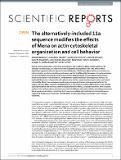The alternatively-included 11a sequence modifies the effects of Mena on actin cytoskeletal organization and cell behavior
Author(s)
Condeelis, John S.; Balsamo, Michele; Mondal, Chandrani; Carmona, Guillaume; McClain, Leslie Marie; Riquelme, Daisy Noelia; Tadros, Jenny; Ma, Duanduan; Vasile, Eliza; Lauffenburger, Douglas A; Gertler, Frank; ... Show more Show less
DownloadThe alternatively-included.pdf (3.741Mb)
PUBLISHER_CC
Publisher with Creative Commons License
Creative Commons Attribution
Terms of use
Metadata
Show full item recordAbstract
During tumor progression, alternative splicing gives rise to different Mena protein isoforms. We analyzed how Mena11a, an isoform enriched in epithelia and epithelial-like cells, affects Mena-dependent regulation of actin dynamics and cell behavior. While other Mena isoforms promote actin polymerization and drive membrane protrusion, we find that Mena11a decreases actin polymerization and growth factor-stimulated membrane protrusion at lamellipodia. Ectopic Mena11a expression slows mesenchymal-like cell motility, while isoform-specific depletion of endogenous Mena11a in epithelial-like tumor cells perturbs cell:cell junctions and increases membrane protrusion and overall cell motility. Mena11a can dampen membrane protrusion and reduce actin polymerization in the absence of other Mena isoforms, indicating that it is not simply an inactive Mena isoform. We identify a phosphorylation site within 11a that is required for some Mena11a-specific functions. RNA-seq data analysis from patient cohorts demonstrates that the difference between mRNAs encoding constitutive Mena sequences and those containing the 11a exon correlates with metastasis in colorectal cancer, suggesting that 11a exon exclusion contributes to invasive phenotypes and leads to poor clinical outcomes.
Date issued
2016-10Department
Massachusetts Institute of Technology. Department of Biological Engineering; Massachusetts Institute of Technology. Department of Biology; Koch Institute for Integrative Cancer Research at MITJournal
Scientific Reports
Publisher
Nature Publishing Group
Citation
Balsamo, Michele et al. “The Alternatively-Included 11a Sequence Modifies the Effects of Mena on Actin Cytoskeletal Organization and Cell Behavior.” Scientific Reports 6.1 (2016): n. pag.
Version: Final published version
ISSN
2045-2322